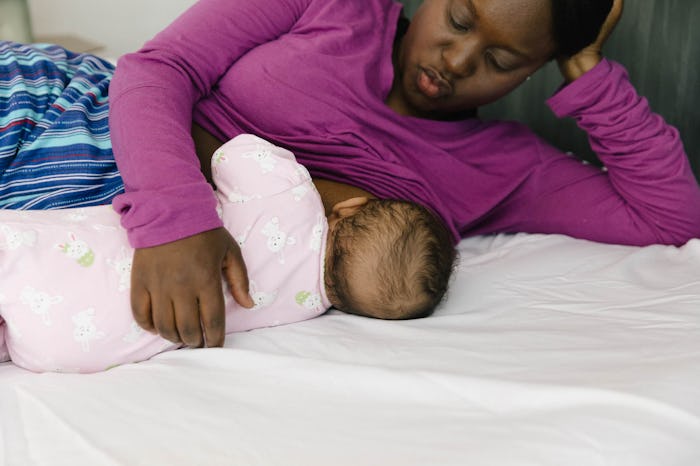When I was pregnant, a woman once stopped me on the street, her eyes wide. "Do you know that after that baby's born, your hair's going to fall out in the shower?" I assured her that I did. "Good," she said, visibly relieved. "Because I didn't, and it was so, so scary." And she went, presumably to warn more pregnant women about their shaggy future. Shedding a bit after baby is normal, and as my doctor explained it, hormonal. Moms know that nursing impacts hormones, too, so it's natural to ask, does breastfeeding affect postpartum hair loss?
Romper reached out to Geoffrey Redmond, MD, director of The Hormone Help Center in New York, who notes that the reason women generally have fuller hair than men is because of estrogen, the "primary-female hormone" that makes hair grow faster and stick around longer. "Estrogen levels rise during pregnancy, which is why hair gets much thicker around months four and five. Unfortunately, after birth of the baby, estrogen levels plummet, causing a shed beginning a few weeks postpartum," Redmond explains.
The good news? The shed only lasts a month or two. But what about when you're breastfeeding? According to Redmond, in theory, breastfeeding should make hair loss increase, because estrogen levels remain low longer. However, in his experience, it doesn't result in permanent hair loss, so don't let it deter you from nursing. And according to Kelly Mom, hair loss among breastfeeding moms and non-breastfeeding moms is pretty much equal.
Unfortunately, there doesn't seem to be a ton of research on this, and every women will have a different experience postpartum. Anecdotally, on forums like Mothering, postpartum hair loss experiences vary widely, regardless of breastfeeding. So who knows? You might get lucky, and in any case, hair grows back.
Angela Christiano and The New York Times have two great words for your next game of Scrabble: telogen effluvium. That's the clinical term for the normal hair shedding after you have your baby. Christiano noted that prolonged breastfeeding (as in, three years) can lead to hormonal and nutritional issues, and suggested that women continue to take vitamins with sufficient iron while nursing to keep themselves — and presumably, their hair — healthy and strong.
Everyone loses hair postpartum, Redmond explains, but for some women, the effect is so mild they don't even notice it. Whether you lose a little or a lot, take heart in knowing that it's only temporary. "Pregnancy does not permanently affect a woman's hormonal health," notes Redmond, except in rare cases involving serious complications. If you continue losing hair for many months, or if your hair loss is severe, check in with your doctor. Otherwise, breastfeed without fear. Your hair will be luscious again soon.
